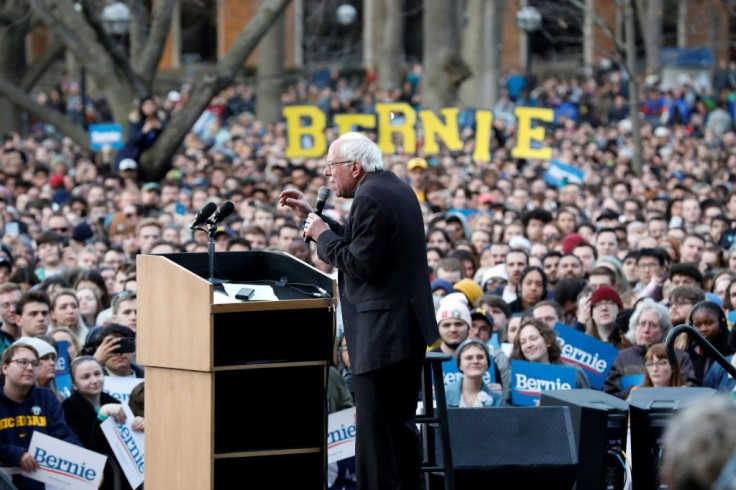Why Sanders' Coronavirus Responses Failed To Revive His Campaign

KEY POINTS
- Sanders put forward specific policy prescriptions to address the crisis
- Biden focuses on a general sense of "leadership" to combat COVID-19
- This topic reveals how the competing wings of the party view politics
Senator Bernie Sanders, I-Vt., had to give way to former Vice President Joe Biden in the race for the Democratic presidential nomination though he had a better policy platform to fight the Covid-19 pandemic and its far-reaching effects.
A day before Wisconsin’s presidential primary, Sanders e-mailed his supporters that “holding this election amid the coronavirus outbreak is dangerous” and that “our campaign will not be engaged in any traditional get-out-the-vote efforts.” This stood in stark contrast to Biden’s response, as he said on Thursday that “I think you could hold the [Wisconsin] election as well as dealing with mail-in ballots and same-day registration.”
Sanders’ viewpoint is in line with what public health officials recommend, and Biden’s stance is directly opposed to it, yet there has been no polling bump for Sanders in response.
Comparing Sanders and Biden’s Twitter feeds provides a window into how both view the crisis, and it also highlights the center of the fight between the competing factions in the party. When speaking about the coronavirus’s impact, Sanders focuses on specific policy prescriptions he believes will help.
I agree with @ewarren that our response to the COVID-19 crisis must include a robust plan to protect the right to vote, and in fact, make it easier to vote.https://t.co/bgWZomzt3j
— Bernie Sanders (@BernieSanders) April 7, 2020
While Biden’s feed emphasizes a general and unspecific form of leadership.
The weeks ahead will be some of the toughest we’ve ever experienced as a nation. We need to face them with the same spirit and resolve that have guided us through previous crises. Because out of every trial and tribulation, America has always emerged stronger — and we will again.
— Joe Biden (@JoeBiden) April 8, 2020
Biden’s website has a “COVID-19 Leadership” page where the emphasis is on language like “in the midst of a growing public health crisis the country is looking for leadership, stability, and trusted experience.” In contrast, Sanders’ website has two issue pages dedicated to the pandemic, titled “priorities for the next coronavirus relief package” and “an emergency response to the coronavirus pandemic” that go heavy on policy prescriptions.
One would think that given the need for specific plans to combat a rapidly escalating crisis, this development would favor Sanders in the race, but polling has long shown that most Democratic voters generally value amorphous declarations of leadership more than specific policy platforms.
In yesterday's Quinnipiac poll, young ppl 18-34 are the only age group that cared more about policy ideas than being a "great leader." pic.twitter.com/tXyUO1C3um
— Astead (@AsteadWesley) May 1, 2019
This polling question goes a long way in describing the difference between the old guard and the newer, younger left flank of the Democratic Party. Younger voters generally prioritize policy more than older voters, but older voters are more consistent voters, hence Biden’s lead (Biden currently has 1,196 delegates to Sanders' 883 in the chase for 1,991 to clinch the nomination).
Sanders could have benefited from his policy-heavy narrative had he successfully packaged his plan with an emphasis on leadership, as polls show that voters believe Trump is handling the coronavirus better than Biden would.
© Copyright IBTimes 2025. All rights reserved.





















